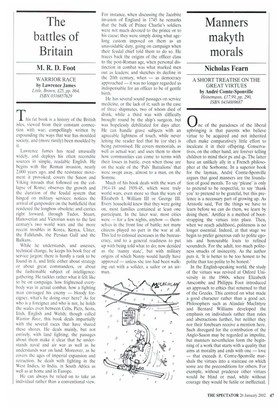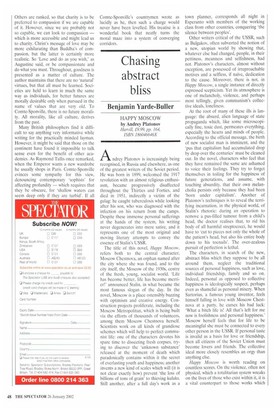Manners makyth morals
Nicholas Fearn
A SHORT TREATISE ON THE GREAT VIRTUES by Andre Comte-Sponyille Heinemann, L17.99, pp. 290, ISBN 0434009687 One of the paradoxes of the liberal upbringing is that parents who believe virtue to be acquired and not inherited often make comparatively little effort to inculcate it in their offspring. Conservatives, on the other hand. are forever telling children to mind their ps and qs. The latter have an unlikely ally in a French philosopher at the Sorbonne. In a superior book for the layman, Andre Comte-Sponville argues that good manners are the foundation of good morals. To say 'please' is only to pretend to be respectful, to say 'thank you' to pretend to be grateful, but this pretence is a necessary part of growing up. As Aristotle said, For the things we have to learn before we can do them, we learn by doing them.' Artifice is a method of bootstrapping the virtues into place. Then, when we reach adulthood, politeness is no longer essential. Indeed, at that stage we begin to prefer generous oafs to polite egoists and honourable louts to refined scoundrels. For the adult, too much politeness smacks of insincerity. As the author puts it, 'It is better to be too honest to be polite than too polite to be honest.'
In the English-speaking world, the study of the virtues was revived at Oxford University in the 1960s, where Elizabeth Anscombe and Philippa Foot introduced an approach to ethics that returned to that of the Greeks. This centred on what made a good character rather than a good act. Philosophers such as Alasdair MacIntyre and Bernard Williams developed the emphasis on individuals rather than rules and abstractions further, but neither they nor their forebears receive a mention here. Such disregard for the contribution of the Anglo-Saxon may be regarded as impolite, but manners nevertheless form the beginning of a work that starts with a quality that aims at morality and ends with one — love — that exceeds it. Comte-Sponville marshals the virtues into a staircase on which some are the preconditions for others. For example, without prudence other virtues would be blind or mad, while without courage they would be futile or ineffectual.
Others are ranked, so that charity is to be preferred to compassion if we are capable of it. However, since we are probably not so capable, we can look to compassion — which is more accessible and might lead us to charity. Christ's message of love may be more exhilarating than Buddha's of compassion, but the latter is certainly more realistic. So 'Love and do as you wish,' as Augustine said, or be compassionate and do what you must. Throughout, goodness is presented as a matter of culture. The author maintains that there are no 'natural' virtues, but that all must be learned. Societies are held to learn in much the same way as individuals, for better futures are morally desirable only when pursued in the name of values that are very old, To Comte-Sponville, there is no future morality. All morality, like all culture, derives from the past.
Many British philosophers find it difficult to say anything very informative while writing for the practically minded layman. However, it might be said that those on the continent have found it impossible to talk sense even for the benefit of other academics. As Raymond Tallis once remarked, when the Emperor wants a new wardrobe he usually shops in Paris. Comte-Sponville evinces some sympathy for this view, denouncing contemporary 'sophists' for affecting profundity — which requires that they be obscure, for 'shallow waters can seem deep only if they are turbid'. If all Comte-Sponville's countrymen wrote as lucidly as he, then such a charge would never have been levelled. His treatise is a wonderful book that neatly turns the moral maze into a system of converging corridors.



















































































 Previous page
Previous page